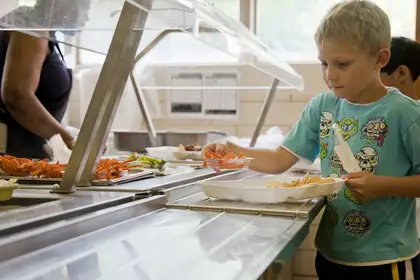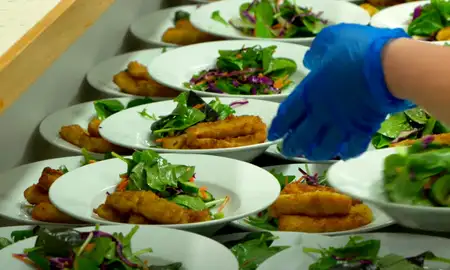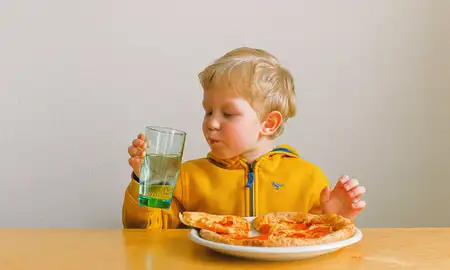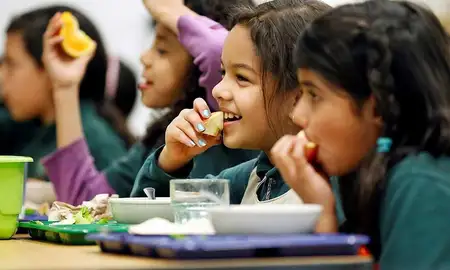
Massey researchers looked at community and school-led meal delivery programmes to understand what makes a programme successful or not.
In a study funded by the Our Land and Water National Science Challenge, researchers looked at community and school-led meal delivery programmes and their roles in the agrifood sector to understand what makes a programme successful or not.
The researchers from Te Kunenga ki Pūrehuroa Massey University involved in this workstream are marketing and sustainability expert Professor Nitha Palakshappa, Research Officer Derrylea Hardy and Socio-cultural Anthropologist Associate Professor Sita Venkatswar.
The researchers found that school meal programmes don’t work when they are designed and assessed based on nutritional content alone. Alongside more nutritious ingredients, programmes that instead include foods that students normally prefer to eat, as part of culturally relevant dishes that look, feel, and taste good, are less likely to have meals left uneaten and thrown out.
The outcomes of the study suggest that meal programmes play a vital role in bridging gaps in nutrition and helping to alleviate food poverty, making it critical that they continue while being tailored better to who they are feeding.
Professor Palakshappa says the most surprising finding was that many of the less successful food in school initiatives are not providing the kind of food that the students want to eat.
“People are less likely to eat food that is not tasty and doesn’t look like something that they are commonly eating at home.
“For some students, if you give them macaroni cheese or spaghetti bolognese, then the chances are that they will recognise and eat it, because it is part of what they are already used to eating. But if I were to give those same students a vegetable curry without at least explaining what it is first, then they’re less likely to eat it. And vice versa for students who prefer eating curries.”
Professor Palakshappa and her colleagues found that successful programmes catered to a school’s unique set of food preferences and cultures, by having students indicate what they wanted to eat from a diverse and multicultural weekly menu and then offering a range of these foods at mealtimes.
“If you make sure that the nutritious food is something that people actually want to eat, then immediately you create a spiral upwards in terms of their health and wellbeing. That has important ramifications later – for anything from labour and productivity through to how people access healthcare.”
The researchers found that the most successful programmes go above and beyond providing lunches. These programmes work closely with schools to enhance students’ positive experiences of food and reduce feelings of shame about needing to take part in the programme.
School staff themselves can play a crucial role in a programme’s success by running food-related classes or activities that slowly introduce students to an unfamiliar food before it is added to meals. For example, the study revealed that teachers successfully piqued students’ interest in trying soybeans by teaching them about the food’s history.
Having an in-built kitchen at the school also makes a difference. This allows programmes to get fresher meals to the table faster, making them more appealing than delivered food. It also minimises food waste, since programmes can then cater for exact numbers of students attending each day. Many effective programmes also make the kitchen or food hub a shame-free safe space for students to get food or advice at any time.
One of the meal programmes that took part in the study is Kura Kai. It supplies schools with freezers to store meals that anyone can take home to feed their whānau or others in their community.
“They created no shame around accessing that food. The food was available in the freezer for people to take it as they needed. There’s no barrier – they can just pick up the food, put it in their bag, and walk out with it," Professor Palakshappa explains.
Some schools run the Kura Kai Rangatahi programme, in which students cook the meals themselves during classes, also gaining NCEA credits. These ‘cook ups’ help to create a stronger connection to the food on their plates.
Involving the students in budgeting, planning and cooking some of the school meals gives them the knowledge and skills that they need to be able to feed their whānau and community.
“At the same time, they were working with horticulture experts in the community to ensure that there were gardens planted so that vegetables were immediately accessible for these cook ups. That meant students got to see how important it was to be in a place or a space where they had access to all these things that allowed them to eat well.”
Food programmes that keep rangatahi connected to cultural knowledge systems about culturally meaningful foods – from growing and harvesting through to cooking and preserving – help to strengthen cultural identity and wellbeing, as well as food security for the wider community.
When programmes work with local food growers or community gardens this helps to provide fresh, relevant ingredients for tailored meals more sustainably, to ensure better wellbeing for students and whānau.
Related news
Research shows significant benefits of school meal programmes
A recent case study on the Ka Ora Ka Ako school lunch programme at Dannevirke High School has revealed clear benefits.

New research reveals many school lunch menus fail to meet Manatū Hauora Ministry of Health guidelines
A recent study has uncovered that many school canteen offerings in Aotearoa New Zealand do not meet the Manatū Hauora Ministry of Health (MoH) guidelines, with over half of the in-house canteen menu items being classified as unhealthy.

Massey offers expert advice on healthy school lunches
The Eat Right, Be Bright campaign have turned to Human Nutrition and Dietetics staff and students for advice about the best types of food for children to improve their dietary intake while at school.
